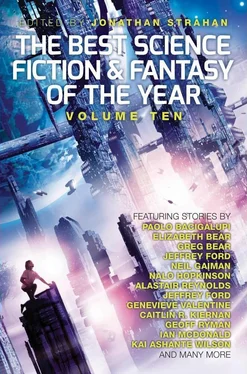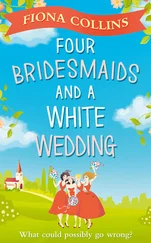I am the perfect hostess. I have poisoned it all.
This is how I serve my husband, my children, my king, my house: with soup and wine and doves drowned in orange spices. With wine so dark and strong any breath of oleander would vanish in it. With the quills of sunless fish and liqueurs of wasps and serpents hung up from my rafters like bunches of lavender in the fall.
It’s many years now since a man of position would consider taking a wife who was not a skilled poisoner. They come to the Floregilium as to an orphanage and ask not after the most beautiful, nor the sweetest voice, nor the most virtuous, nor the mildest, but the most deadly. All promising young ladies journey to Brugmansia, where the sea is warm, to receive their education. I remember it more clearly than words spoken but an hour ago – the hundred towers and hundred bridges and hundred gates of the Floregilium, a school and a city and a test, mother to all maidens.
I passed beneath the Lily Gate when I was but seven – an archway so twisted with flowers no stone peeked through. Daffodils and hyacinths and columbines, foxglove and moonflower, poppy and peony, each one gorgeous and full, each one brilliant and graceful, each one capable of killing a man with root or bulb of leaf or petal. Another child ran on ahead of me. Her hair was longer than mine, and a better shade of black. Hers had blue inside it, flashing like crystals dissolving in a glass of wine. Her laugh was merrier than mine, her eyes a prettier space apart, her height far more promising. Between the two of us, the only advantage I ever had was a richer father. She had a nice enough name, nice enough to hide a pit of debt.
Once my mother left me to explore her own girlish memories, I followed that other child for an hour, guiltily, longingly, sometimes angrily. Finally, I resolved to give it up, to let her be better than I was if she insisted on it. I raised my arm to lean against a brilliant blue wall and rest – and she appeared as though she had been following me, seizing my hand with the strength of my own father, her grey eyes forbidding.
“Don’t,” she said.
Don’t rest? Don’t stop?
“It’s chalcanthite. Rub up against it long enough and it will stop your blood.”
Her name was Yew. She would be the Horn of her House, as I am the Lily of mine. The Floregilium separates girls into Lilies – those who will boil up death in a sealmeat pie, and Horns – those who will send it fleeing with an emerald knife. The Lily can kill in a hundred thousand fascinating ways, root, leaf, flower, pollen, seed. I can brew a tea of lily that will leave a man breathing and laughing, not knowing in the least that he is poisoned, until he dies choking on disappointment at sixty-seven. The Horn of a unicorn can turn a cup of wine so corrupted it boils and slithers into honey. We spend our childhoods in a dance of sourness and sweetness.
Everything in Floregilium is a beautiful murder waiting to unfold. The towers and bridges sparkle ultramarine, fuchsia, silvery, seething green, and should a careless girl trail her fingers along the stones, her skin will blister black. The river teems with venomous, striped fish that take two hours to prepare so that they taste of salt and fresh butter and do not burn out the throat, and three hours to prepare so that they will not strangle the eater until she has gone merrily back to her room and put out her candles. Every meal is an examination, every country walk a trial. No more joyful place exists in all the world. I can still feel the summer rain falling through the hot green flowers of the manchineel tree in the north orchard, that twisted, gnomish thing, soaking up the drops, corrupting the water of heaven, and flinging it onto my arms, hissing, hopping, blistering like love.
It was there, under the sun and moon of the Floregilium, that I read tales of knights and archers, of the days when we fought with swords, with axes and shields, with armor beaten out of steel and grief. Poison was thought cowardice, a woman’s weapon, without honor. I wept. I was seven. It seemed absurd to me, absurd and wasteful and unhappy, for all those thousands to die so that two men could sort out who had the right to shit on what scrap of grass. I shook in the moonlight. I looked out into the Agarica where girls with silvery hair tended fields of mushrooms that wanted harvesting by the half-moon for greatest potency. I imagined peasant boys dying in the frost with nothing in their bellies and no embrace from the lord who sent them to hit some other boy on the head until the lord turned into a king. I felt such loneliness – and such relief, that I lived in a more sensible time, when blood on the frost had been seen for the obscenity it was.
I said a prayer every night, as every girl in the Floregilium did, to Muscanine, the Gardener Queen, who took her throne on the back of a larkspur blossom and never looked back. Muscanine had no royal blood at all. She was an apothecary’s daughter. After the Whistling Plague, such things mattered less. Half of every house, stone or mud or marble, died gasping, their throats closing up so only whines and whistles escaped, and when those awful pipes finally ceased, the low and the middling felt no inclination to start dying all over again so that the lordly could put their names on the ruins of the world. Muscanine could read and write. She drew up new articles of war and when the great and the high would not sign it, they began to choke at their suppers, wheeze at their breakfasts, fall like sudden sighs halfway to their beds. The mind sharpens wonderfully when you cannot trust your tea. And after all, why not? What did arms and strength and the best of all blades matter when the wretched maid could clean a house of heirs in a fortnight?
War must civilize itself, wrote Muscanine long ago. So say all sensible souls. There can be no end to conflict between earthly powers, but the use of humble arms to settle disputes of rich men makes rich men frivolous in their exercise of war. Without danger to their own persons, no Lord fears to declare battle over the least slight – and why should he? He risks only a little coin and face while we risk all but benefit nothing in victory. There exists in this sphere no single person who does not admit to this injustice. Therefore, we, the humble arms, will no longer consent to a world built upon, around, and out of an immoral seed.
The rules of war are simple: should Lord Ambition and the Earl of Avarice find themselves in dispute, they shall agree upon a castle or stronghold belonging to neither of them and present themselves there on a mutually agreeable date. They shall break bread together and whoever lives longest wins. The host bends all their wisdom upon vast and varied poisons while the households of Lord Ambition and the Earl bend all their intellect upon healing and the purifying of any wicked substance. And because poisons were once a woman’s work – in the early days no knight could tell a nightshade from a dandelion – it became quickly necessary to wed a murderess of high skill.
Of course, Muscanine’s civilized rules have bent and rusted with age. No Lord of any means would sit at the martial table himself nowadays – he hires a proxy to choke or swallow in his stead. But there is still some justice in the arrangement – no one sells themselves to battle cheaply. A family may lift itself up considerably on such a fortune as Lord Ambition will pay. No longer do two or three men sit down simply to their meal of honor. Many come to watch the feast of war, whole households, the king himself. There is much sport in it. Great numbers of noblemen seat their proxies in order to declare loyalties and tilt the odds in favor of victory, for surely someone, of all those brawny men, can stomach a silly flower or two.
Читать дальше












